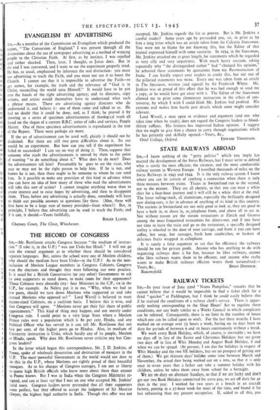THE RECORD OF CONGRESS
Sta,—Mr. Rawlinson attacks Congress because " the medium of instruc- tion " (I take it, in the U.P.) " was not Urdu but Hindi." I will not go into the eternal argument as to whether these should be considered separate languages. But, unless the school were one of Moslem children, why should the medium have been Urdu—in the U.P.? As to the non- inclusion of Moslem League members in Congress Cabinets, Congress wan the elections and thought they were following our own practice. Is it usual for a British Conservative (or any other) Government to ask its own supporters to stand down, to make room for their opponents? Those Cabinets were absurdly tiny: four Ministers in the C.P., six in the U.P., for example. As Nehru put it to me, " Why, when we had so few posts, should we turn down Moslems who supported us and take instead Moslems who opposed us? " Lord Wavell is believed to want decent-sized Cabinets, on a coalition basis. I believe this is wise, and that Congress will agree. " Moslems never got their fair share of public appointments." This kind of thing may happen, and not merely under Congress rule. I could point to a very large State where a Moslem Prince rules over a population which is 8o per cent. Hindu, and any Political Officer who has served in it can tell Mr. Rawlinson that not five per cent. of the higher posts go to Hindus. Also, its medium of University instruction is Urdu, which hardly any of its people, Moslem or Hindu, speak. Why does Mr. Rawlinson never criticise any but Con- gress leaders?
In the letter which began this correspondence, Mr. J. D. Jenkins, of Poona, spoke of wholesale desecration and destruction of mosques in the U.P. The mostlpowerful Government in the world would not dare to do this in the U.P., whose Moslems are rightly proud of their beautiful mosques. As to his charges of Congress outrages, I am not at liberty to quote high British officials who knew more abOut these than anyone in Poona knows. But I was in India when the Congress Ministries re- signed, and can at least sarthat I met no one who accepted Mr. Jenkins' lurid story. Congress leaders never pretended that all their supporters were perfect, but they offered to accept the judgment of Sir Maurice Gwyer, the highest legal authority in India. Though this offer was not
accepted, Mr. Jenkins regards the list as proven. But is Mr. Jenkins a careful reader? Some years ago he persuaded you, sir, to print as by him a long letter which was an article taken from the Calcutta Statesman. You were not to blame for not knowing this, but the Editor of that journal expressed himself with some austerity. In 1934, in the Statesman, Mr. Jenkins attacked me at great length, for statements which he regarded as very silly and very unpatriotic. With much heavy sarcasm, asking repeatedly why " the distinguished author " had " changed his opinion," he rebutted these statements by quotations from my Reconstruction of India. I can hardly expect your readers to credit this, but not one of the pilloried statements was mine. Every one was taken from an article in The Spectator, written (and signed) by Sir Frederick Whyte. Mr. Jenkins was so proud of this effort that he was fool enough to send me a copy, or he would have got away with it. The Editor of the Statesman allowed me to print some elementary instruction in the ethics of con- troversy, by which I wish I could think Mr. Jenkins had profited. His extreme zeal makes him hustle past details which some might consider relevant.
Lord Wavell, a man open to evidence and argument (and one who takes time when he reads), does not regard the Congress leaders as blood- thirsty ruffians. His fairness has impressed Indian opinion. I suggest that we ought to give him a chance to carry through negotiations which he has patiently and skilfully opened.—Yours, &c.,


























 Previous page
Previous page